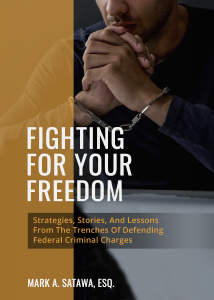Fighting For Your Freedom
 The most crucial thing in understanding a federal criminal case is to be aware of two things: (1) the resources behind a federal criminal prosecution; and (2) the overarching impact of the US sentencing guidelines.The first is that the resources available to the government in federal criminal cases are astronomical. They have the full power of the federal government, and law enforcement agencies including the FBI, DEA, ATF, Homeland Security, ICE (Immigration Customs Enforcement), and the USPS inspector.
The most crucial thing in understanding a federal criminal case is to be aware of two things: (1) the resources behind a federal criminal prosecution; and (2) the overarching impact of the US sentencing guidelines.The first is that the resources available to the government in federal criminal cases are astronomical. They have the full power of the federal government, and law enforcement agencies including the FBI, DEA, ATF, Homeland Security, ICE (Immigration Customs Enforcement), and the USPS inspector.
Each of these agencies has an enormous workforce. They also have technological resources, the use of drones, infrared technology, computer experts, and the ability to analyze any and every form of technology. For example, their experts can analyze a cellphone, a tablet, a laptop, and a desktop. Also, federal criminal investigations have access to the FBI crime lab and the DEA drug crime lab when they need to analyze or process evidence.
Federal Law Enforcement has access to the world’s most technologically advanced and well-funded crime labs, that that can analyze fingerprints, a cell phone, a computer, or a laptop.
Also, federal prosecutors have large staffs of lawyers, whether the Department of Justice or the local US attorney’s office. They are the most prominent criminal practice law firm in every city they exist in. They are fully staffed with well-trained, well-paid, and competent prosecutors (called Assistant United States Attorneys), paralegals, investigators, and support staff.
Because of all their advantages, it’s complicated for a lawyer to fake the defense of a federal criminal case. The Government’s resources, workforce, money, technology, and other support make winning a federal criminal case difficult, even by accident. Without a massive amount of preparation, investigation, and research, it is an enormous undertaking for an attorney to defend a federal criminal case.
The second aspect to understand in a federal criminal case is the tremendous impact of the sentencing guidelines. Federal criminal practice is driven by the guidelines, even before a conviction, whether by trial or a plea agreement.
The federal criminal case guidelines are draconian and call for extremely long sentences (which the guidelines make presumably valid). Therefore, every facet of a federal criminal case must be viewed through the prism of how this will affect the guidelines if this client ever goes to sentencing. In other words, every decision in a federal criminal case is driven in some way by the ultimate guideline calculation that applies to the case. Several decisions must be made throughout a federal criminal case and right from the beginning with the initial appearance.
Frequently a decision must be made as early as at the detention hearing or during pretrial motion practice, whether to plead guilty to trial or what to plead guilty to, and how to negotiate a Rule 11 Plea Agreement. That will often include a decision whether to cooperate with the Feds. Finally, a decision must be made to prepare the case and the client for sentencing.
The only way to properly analyze your actual position as target versus witness, and the true risks associated when the Feds contact you, is through consulting with an experienced federal criminal defense attorney.
An experienced federal defense attorney will help you make decisions, and their advice and help early in the case will make a difference between whether you are a witness or a target, which makes all the difference in the world. So the earlier you get a lawyer involved in your federal criminal case, the better it will be on all levels.

Call Today For Your Free Case Strategy Session
(248) 509-0056
